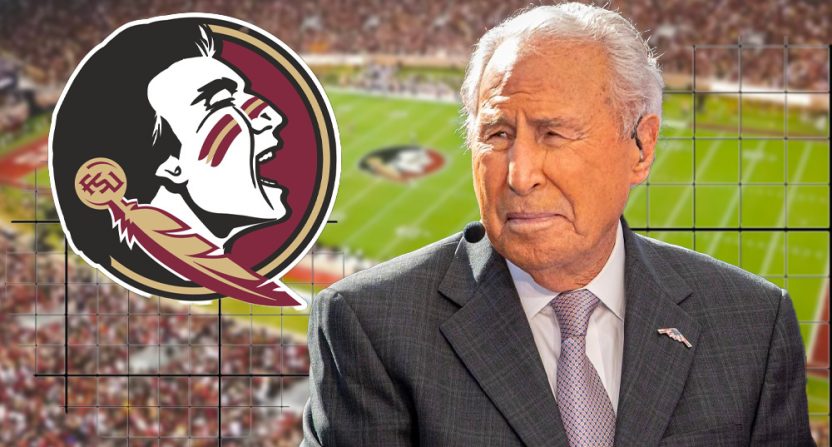For over three decades, Lee Corso has been the heartbeat of ESPN’s “College GameDay,” a beloved Saturday morning ritual that blends spirited debate, insider analysis, and college football’s unique pageantry. The moment Corso dons the headgear of his predicted winning team is now etched into American sports culture—a tradition celebrated by fans and players alike. So when ESPN announced that the iconic analyst would be making his final appearance on “GameDay” this fall, emotions ran high. The final destination for his farewell tour? Columbus, Ohio. The home of the Buckeyes. But in a surprising twist that’s sparked waves of debate across the college football world, Corso’s own son has voiced deep disappointment over the network’s decision to end his father’s legendary run in Ohio State territory.
For fans of “College GameDay,” Lee Corso is not just a broadcaster—he’s a living institution. Since joining the show in 1987, Corso brought color, unpredictability, and humor to what was once a straightforward pregame program. His wildly popular headgear segment, in which he dramatically chooses the team he believes will win by putting on a school mascot’s head, has become the defining moment of every show. Even as his health has declined in recent years, ESPN has made it a point to include Corso in every episode possible, out of reverence for his legacy and the unmistakable magic he brings.
When the network revealed plans for Corso’s farewell, the expectations were enormous. Speculation swirled about the final location. Would it be Florida State, where he played and coached, and whose colors he still proudly wears? Would it be Indiana, where he led the Hoosiers to a rare bowl victory as head coach? Or maybe one of the SEC powerhouses he’s always had a soft spot for, like Alabama or Georgia? Instead, the final pick was Ohio State—a program Corso has respected but never been particularly tied to. And that’s where the disappointment began, most notably with his son, Steve Corso.
Speaking candidly in an interview earlier this week, Steve Corso didn’t hold back. “We all love Ohio State,” he began, “but if this is truly going to be the last time my dad sits behind that ‘GameDay’ desk, then it should mean something more personal. It should be a place with real emotional connection. Columbus isn’t that place for him.” The remarks immediately stirred passionate reactions across social media, igniting discussions among college football fans, media personalities, and even former players.
For Steve, this wasn’t just about geography—it was about honoring legacy. He recalled moments from his childhood spent on campuses with his father, traveling from Tallahassee to Bloomington, and even making GameDay road trips in the early days when the show was still finding its identity. “Dad gave his heart to the game,” Steve continued. “And when you look at the places that shaped him—Florida State, Indiana—you realize there’s a missed opportunity here. This final show should be something deeply sentimental, not just a ratings play.”
The choice of Ohio State raises several logistical and strategic questions. There’s no denying the Buckeyes are perennial title contenders, and their fan base is one of the most passionate in the sport. Columbus guarantees a massive crowd, major media coverage, and likely, a game with significant playoff implications. ESPN, of course, has a business to run. In a fall lineup stacked with heavyweight matchups, placing Corso’s finale in a high-stakes environment makes sense from a production standpoint. Yet, critics argue, this decision reduces Corso’s farewell to just another cog in the machine, rather than a reflective celebration of a man who helped build the brand from the ground up.
Several former ESPN colleagues have weighed in, including Kirk Herbstreit, Desmond Howard, and Rece Davis. While most have remained diplomatic, acknowledging the gravity of the moment, some have hinted at private disagreements with the final call. Herbstreit, an Ohio State alum himself, reportedly pushed for a different location internally, but ultimately supported the network’s decision. “Lee deserves the biggest stage possible,” he told a local Columbus radio station. “Whether it’s the Horseshoe or anywhere else, we’re going to give him the send-off he deserves.”
Yet for those closest to Corso, the sentiment remains bittersweet. In his own quiet way, Corso has expressed appreciation for the attention but stopped short of full endorsement. “Wherever it is, I’m just glad to be a part of it,” he said in a brief statement. Observers noted that his tone was notably restrained, lacking the trademark playfulness that has characterized his persona for decades. Those close to the production team suggest that Corso had privately lobbied for a return to Tallahassee, hoping to close the circle where it all began.
That dream, however, was never seriously entertained by ESPN executives. A source familiar with the decision-making process described it as a “high-level programming directive,” emphasizing the need to maximize exposure and viewer numbers. “This is a business, after all,” the source added. “And the Ohio State game offers the best combination of atmosphere, competitive relevance, and crowd engagement.” That calculus, while pragmatic, has left many—including Corso’s own family—questioning whether the soul of the show has been compromised.
It’s not the first time ESPN has faced criticism for putting brand over sentiment. In recent years, “GameDay” has been increasingly driven by TV ratings and social media metrics, with location decisions often based on marquee matchups rather than storytelling potential. While this strategy has succeeded in maintaining relevance in an era of fragmented viewing habits, it’s also drawn backlash from purists who see the show as a cultural touchstone, not just a marketing vehicle.
Lee Corso’s impact transcends broadcast journalism. For generations of fans, he’s been the quirky uncle who makes college football feel like a family gathering. His goofy antics, heartfelt commentary, and occasional blunders have made him both relatable and revered. The decision to wrap up his “GameDay” tenure in Columbus, rather than at a place steeped in his personal history, strikes many as a symbolic disconnect from the very essence of his appeal.
Steve Corso’s comments, while emotional, have also opened a broader conversation about how sports media honors its legends. “This is more than just a job for my dad,” Steve said. “It’s his life. And when someone gives 30-plus years to a show, you’d hope that their final day wouldn’t be decided by spreadsheets or Nielsen charts.” He concluded with a hopeful note, expressing gratitude to fans and asking them to celebrate the moment, regardless of location. “Dad always says, ‘Not so fast, my friend!’ And maybe that’s what this is. Maybe it’s not the end. Maybe it’s just a pause.”
Whether Corso’s final “GameDay” appearance takes place in Columbus or not, it will undoubtedly be an emotional affair. Fans can expect a montage of unforgettable moments, tributes from across the college football spectrum, and likely, one last glorious headgear pick. Yet, as the curtain falls on one of sports television’s most endearing figures, the backdrop may feel a little less meaningful than it could have been.
In the end, this story is about more than location—it’s about legacy. And while the grandeur of Ohio Stadium will provide a stunning stage, some will always wonder what might have been had ESPN chosen heart over hype. As Lee Corso takes his final bow, surrounded by the roaring Buckeye faithful, the cheers will be real, the tears will be honest, but for his family—and for many longtime fans—there may also be a quiet ache for the farewell that could have been.



